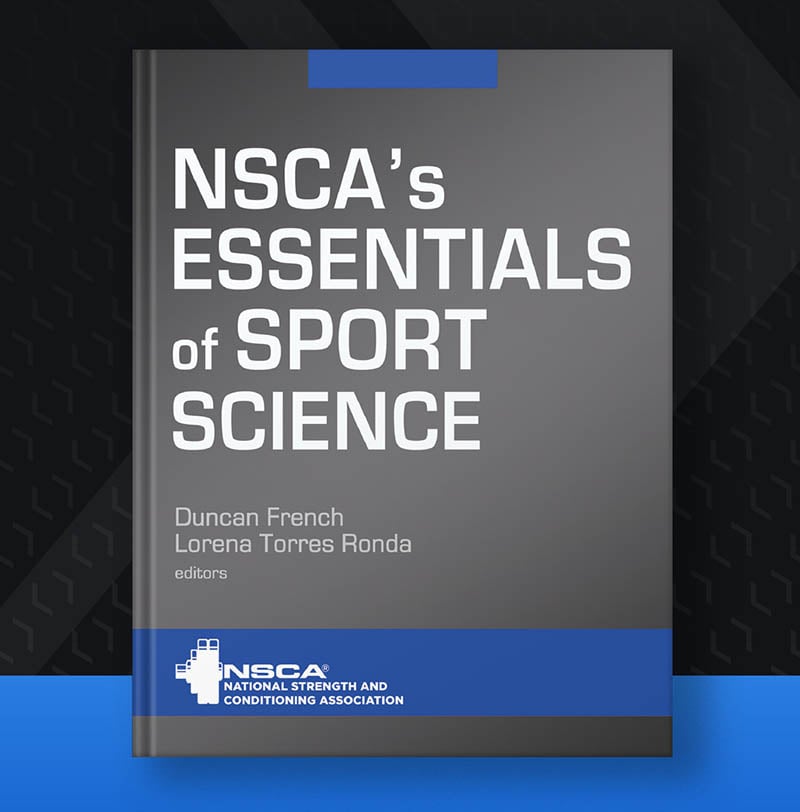NSCA’S ESSENTIALS OF SPORT SCIENCE TEXTBOOK

Editors
 Duncan French
Duncan French
Duncan French is the vice president of performance at the Ultimate Fighting Championship (UFC) Performance Institute and has more than 20 years of experience working with elite professional and Olympic athletes. Prior to joining the UFC, French was the director of performance sciences at the University of Notre Dame and a technical lead for strength and conditioning at the English Institute of Sport.
 Lorena Torres Ronda
Lorena Torres Ronda
Lorena Torres Ronda has extensive experience as a high-performance specialist in professional and Olympic sports. She has served as the performance director for the Philadelphia 76ers (NBA), the sport scientist and research and development coordinator for the San Antonio Spurs (NBA), and the sport scientist and strength and conditioning coach for the F.C. Barcelona basketball team and the Spanish national swimming team. Additionally, she has been a part of the NBA scientific committee.
Textbook Description
Meeting a Growing Need
Performance and sport scientists are in demand more than ever before. Not only are researchers at universities and academic institutions scientifically investigating methods and best practices to improve sport and athletic performance, but collegiate athletic teams, professional sports organizations, and private training companies are applying evidence-based scientific principles to expand the limits of athletic potential, identify key areas related to team success, and support a broad spectrum of athletes to gain a competitive advantage.
Comprehensive Sport Science Theory and Application
NSCA’s Essentials of Sport Science features 52 globally-recognized industry leaders across the multiple disciplines of human performance and sport science. It expands on the key scientific underpinnings of sport science—physiology, biochemistry, biomechanics, nutrition, and skill development—to address the use of data analysis, load monitoring, and performance technology. The sport scientist’s role is central throughout, including knowledge of training theory, determining and evaluating key performance indicators, conducting athlete monitoring and assessments, and managing and disseminating complex performance information. The integration of scientific methodology and applied technical skills will guide sport scientists in drawing conclusions aimed at supporting or re-envisioning training methods, contributing towards competition strategy, and improving athletes’ overall readiness and performance.
Gain Vital Knowledge to Advance Professionally
The ground-breaking textbook presents a holistic overview of the scientific principles, knowledge, and expertise to support athletic and team performance as a modern-day sport scientist. It further defines professional roles and scope of practice for existing and aspiring sport scientists within interdisciplinary high performance athletic programs, in addition to assisting candidates for the NSCA’s The Certified Performance and Sport Scientist (CPSS) certification exam. Readers will come away with advanced knowledge of current performance and sport science practices, and the analytical tools to employ scientific processes to maximize athletic performance and optimize communication within sporting organizations.
Please log in to view your pricing.
This product is currently unavailable.
Be sure to download the supplemental chapter:
Periodization and Programming for Team Sports
by Benjamin H. Gleason, PhD, CSCS,*D, RSCC
Excerpts
A HOLISTIC APPROACH TO SPORT PERFORMANCE
This is an excerpt from NSCA's Essentials of Sport Science by NSCA -National Strength & Conditioning Association, Duncan N. French & Lorena Torres-Ronda.
By Duncan N. French, PhD
Supporting athletes to maximize their performance has not always been interdisciplinary. Indeed, as the performance sciences (e.g., physiology, medical services, strength and conditioning, dietetics) have evolved over roughly the past century, technical disciplines have matured at different rates (i.e., the world’s first sports medicine establishment took shape in the early 1900s, whereas strength and conditioning coaching became popular only in the late 1960s), and as a consequence the foresight to integrate and collaborate has not...
UNDERSTAND WORKLOAD DEPENDENCE OF INJURIES
This is an excerpt from NSCA's Essentials of Sport Science by NSCA -National Strength & Conditioning Association, Duncan N. French & Lorena Torres-Ronda.
By Johann Windt, PhD, and Tim Gabbett, BHSc (Hons), PhD
Athlete workloads and subsequent adaptation are fundamental sport science principles (14, 15, 82). The concepts of training load modeling and external and internal workload are covered in greater detail in chapter 2 and part IV of this text. Much of the traditional workload research dealt with performance modeling (8, 9) or designing workouts like interval training schemes (31). Since 2000 (especially since 2010), there has been an exponential rise in...
THE INNOVATION PROCESS IN SPORT SCIENCE
This is an excerpt from NSCA's Essentials of Sport Science by NSCA -National Strength & Conditioning Association, Duncan N. French & Lorena Torres-Ronda.
By Lorena Torres Ronda, PhD
Innovation is associated with technology, but technology is only a form of innovation. Innovation can be defined as the introduction of something new, an idea or behavior in the form of a technology, product, service, structure, system, or process (10). Technology, and the future of technology innovation, must yield scientific knowledge for practical purposes, and the artifacts, devices, equipment, or materials directed to this end should address performance gaps to accomplish specific tasks or to...
- Privacy Policy
- Terms of Use
- Retraction and Correction Policy
- © 2025 National Strength and Conditioning Association
